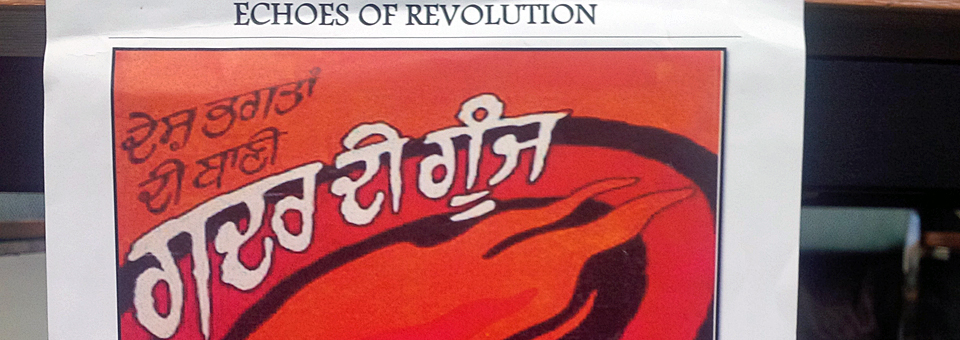Earlier this week I was at the School of Oriental and African Studies (SOAS) in central London where the SOAS South Asian Film Society and Ghadar International had jointly organised an event to mark a hundred years since the formation of the revolutionary Ghadar Party. The assembled panel had been invited to speak about the legacy of the Ghadar movement and its fundamental importance in trying to remove the Imperialist stronghold over South Asia. Although it was disappointing to see so few turn out for the event, it was heartening to hear that non-Punjabi academics were now taking an interest in the achievements of Kartar Singh Sarabha, Sohan Singh Bhakna and their fellow patriots. The principles which they lived by and stood for are particularly relevant today because the problems that the Punjab continues to face are largely the same as those of a century ago.
The Ghadar Party was established by Punjabi migrants chiefly in California to fight against British occupation of South Asia. At that time, the nation states of India and Pakistan existed only in the imagination (perhaps of Nehru and Jinnah, although not exclusively!) Countless men left the Punjab looking for a better life, at first to other parts of South-East Asia such as Malaysia, but then on to the west coast of the Americas, to British Columbia and California. There instead of the opportunity and freedom that they had hoped for they found only more hard labour and discrimination. Many of those who had made the arduous journey to the new lands were well-educated – in both the modern and unconventional sense – and were outraged at the treatment that they received. They channelled their energy into fighting the root cause of that which had led them to leave their homes and loved ones. They came together to create the Ghadar Party aimed at removing the oppressor from the positions where they were enslaving millions.
Each of the speakers touched upon what it was that the Ghadar Party was trying to achieve and how they went about doing that. It was an event intended for the general public and so understandably the speakers made few attempts to dig deeper and simply provided an overview of activity, though with a few notable exceptions including a fascinating depiction of the international network that the Ghadar Party developed to orchestrate their plans. Indeed some of the ideas presented by that particular speaker caused me to think even more about the parallels between the time period in which the Ghadar Party rose and the present day.
Hoping to provoke more debate on this topic, I proffered this idea and asked the panel as well as those in attendance why it was that the modern day Punjabi men who had been forced to leave home and work for a pittance in foreign lands were not similarly creating the Ghadar Party of the 21st century. Of course, the answer to such a question is not so simple by any means, but my intention was to provoke more thoughts for me and others to deliberate upon. There were a number of responses, the most interesting of which was put forward by a fellow attendee. He stated that it was important to keep in mind that notions of nationhood and a sense of belonging which clearly existed a century ago were now blurred. At an international level, civilisations are in a state of redefining identity so recognising who the oppressor is, for any group of people, is not as clear cut as one might think. Today oppression might be in the hands of the prevailing regime, tomorrow it might be the incoming leaders of a coup, whilst the day after it might be your fellow revolutionary.
Modern democracy is a complex web of questions, theories and notions, one that resides uneasily in lecture theatres just as it does in major city squares around the World. I count myself lucky and blessed that I can peacefully engage in discourse – the theory if you will – and am not forced to find my way through the maze publicly where questions of democracy and oppression are debated through practice. I cannot help but be saddened that so few Sikhs take the time to become active in this way, to learn, debate and contemplate. I unashamedly believe that we are the harbingers of a Utopian society purely because of the doctrine and systems that have been instilled into our way of life. But as has been proven with the cases of Professor Bhullar and Balwant Singh Rajoana over the last year, thought and principle has been removed from our direction as a Panth, just as the disregarded incarceration of Daljit Singh Bittu and Kulbir Singh Barapind proves that we are veiled in ignorance. A return to the ways of the Ghadarites, steeped in learning and discourse is long overdue. A century has passed, but as I think on it now, it feels like more.





